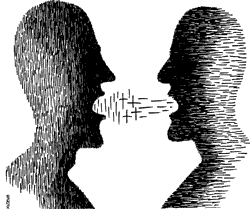 The Maoists have conferred legitimacy upon Prime Minister Lokendra Bahadur Chand's government. But that's not what really riles Kangresis, comrades and others in the beleaguered political centre. Since they are the ones complaining the loudest about how the palace has appropriated full executive powers, they know where the credit would have to go if the peace process succeeded.
The Maoists have conferred legitimacy upon Prime Minister Lokendra Bahadur Chand's government. But that's not what really riles Kangresis, comrades and others in the beleaguered political centre. Since they are the ones complaining the loudest about how the palace has appropriated full executive powers, they know where the credit would have to go if the peace process succeeded. Worse, one of the two hitherto obscure facilitators pointedly asserted there is a greater chance of success this time precisely because the main parties aren't around to play their games. (I wonder what Messrs Jhapali and Lamichhane thought of a cabinet where key colleagues of Narayan Singh Pun were ruling out a breakthrough until the very end. Constructive deception or contemptuous deceit?)
Not that some mainstream politicians weren't up to something of their own. Forget about the CPN-UML. They were too obsessed with the threat of implosion ahead of the party convention. The Kangresi trinity was back in action. The abrupt moderation in Nepali Congress president Girija Prasad Koirala's anti-palace rhetoric after the armed police chief's murder couldn't have been only a reflection of the nation's funereal mood. Was Krishna Prasad Bhattarai's decision to break his long vow of silence by demanding the restoration of the House of Representatives inspired purely by electoral altruism? Was Sher Bahadur Deuba really so hurt by the Maoists' conduct last time that he couldn't contemplate sitting down for talks with them again?
It's easy to see the lack-of-transparency credo cutting across mainstream party lines as a symptom of injured pride. The moans of marginalisation, however, have a deeper message. Since negotiations often involve a course the interlocutors wouldn't have embarked on had they known what lay ahead, some allowance for uncertainty is warranted. When there are far too many questions than answers, you have to get serious. Speculation over a possible connection between the extreme right and the extreme left has already cast a shadow on the peace process. Might the palace want to use its current assertiveness to seek a formal political role tomorrow? Such questions are logical, but should not be allowed to cloud our immediate priorities.
We've passed the phase where secret negotiations were a compulsion of sorts. From here on, behind-the-scenes manoeuvrings can only foment misfortune. The negotiators must not be allowed to speak in different languages to the media and on the table. (How many of us aren't still dying to know what the leaders of six parties in the dissolved Lower House really told the king during the first week of October 2002?) Public knowledge of the substantive issues could prepare the people for the ensuing compromises. Those intent on preserving the gains of the 1990 People's Movement and those committed to building on them are invoking the sovereign people. Instead of languishing in lament, the mainstream parties should recognise their strength. They can make the people feel a sense of partnership every step of the way.
Their activism would help achieve another critical objective-demilitarising the peace process. Both sides have come this far after recognising that their armed might could lead them no further. It's now time for political minds to speak up. Since it would fall on the political centre to run any new order, mainstream parties must take their seats around the table. Despite their evident reservations, most would probably do that. They must feel comfortable. A persistent sense of marginalisation would preclude them from going along with the agenda and unravel the entire process. That same feeling, on the other hand, could make any outcome they endorsed meaningless.
Mainstream parties must work to ensure that drafts and revisions are as explicit as possible. That way, everybody could recognise their common interests in compromise and the perils of maintaining the status quo. Creative ambiguity may make it easier for the interlocutors to come closer. The rest of the country would be better off if everybody understood they were reading from the same text.
One lesson from 1990 is particularly instructive. At that late-night meeting at Narayanhity on 8 April, Bhattarai equated the lifting of the ban on political parties with the restoration of multiparty democracy. United Left Front president Sahana Pradhan did not share that sentiment and told him so. Silence. As a result, we still can't figure out Chand's place in history-the last panchayat prime minister or the first one under the restored multiparty system? Or both, since his government straddled the two eras? That may look like a historical footnote. Just don't say it hasn't haunted our collective conscience.


